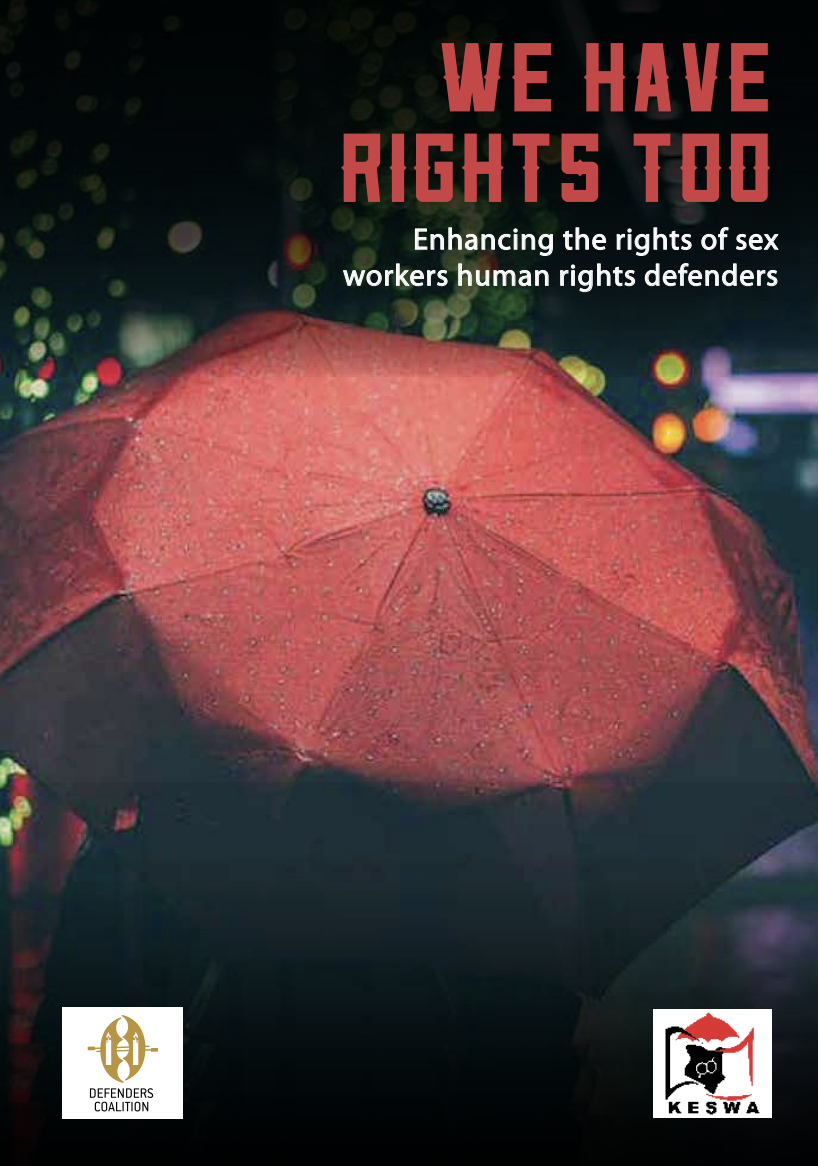
23 March, 2021
We Have Rights Too: Enhancing the rights of sex work human rights defenders (REPORT)
This report was first published on Defenders Coalition-Kenya’s website
SUMMARY OF THE REPORT
Globally, sex work is highly contested. Some states have created legal protection regimes while others criminalize sex work. In Kenya, sex workers face high levels of violence, stigma, discrimination and other human rights violations. The stigma is due to the criminalization of sex work, discrimination based on gender, race, HIV status, drug use or other factors. Most violence against sex workers is a manifestation of gender inequality and discrimination directed at women, men and transgender individuals who do not conform to gender and heterosexual norms.
Sex Work Human Rights Defenders (SWHRDs) undertake a very critical role of advocating for the rights of sex workers amidst serious risks and threats to themselves, their families and the sex work community at large. Like other human rights defenders (HRDs), SWHRDS play a significant role in safeguarding our democracy to ensure that it continues to open more, become pluralistic and promotes the principles of rule of law and good governance. In view of this, Defenders Coalition and KESWA undertook a research among sex workers community activists from across the country to understand their working environment, their challenges and coping strategies.
The project aimed at carrying out mapping of the security concerns for sex worker HRDs and HRDs working on sex worker rights by carrying out one day dialogue sessions with the HRDs drawn from five regions, NyanzaWestern, Nairobi-Central, Rift valley, North Eastern and Coast.
The aim of this exercise was to:
a) Provide a safe and open platform for experience sharing among HRDs, examining the vital role they play as agents of social change and transformation.
b) Highlight the security concerns and challenges faced by HRDs in the various regions and to make specific recommendations for commensurate responses.
c) Develop collective strategies of ensuring the safety and security of HRDs at risk as well as securing the working environment.
d) Identify existing mechanisms that can be utilized for the protection of human rights defenders.
Throughout the exercise, it was clear that the SWHRDs have organically organized in one way or the other into groups that serve as safeguards as they undertake their work. They meet often and have a mechanism for information sharing, including security threats alerts, arrests and other form of risks that they may encounter. It was evident that the work of SWHRDs and that of sex workers has been highly criminalized. This criminalization has been used as a strategy to delegitimize the human rights struggles and to reduce public support towards them. Subsequently, this has shrunk the space to advance social change and transformation for sex work.
This notwithstanding, the display of tenacity, resolve and hope for a better working environment gives the SWHRDs the morale to keep fighting for the observation and promotion of their human rights. Under the mantra: ‘’we are human too, we have rights’’ they keep the fire burning. Sex work HRDs have also started to organize themselves to collectively defend their rights and to improve their working and living conditions such as protection and economic empowerment initiatives.
RECOMMENDATIONS FROM THE STUDY
1. Every conversation that objectively seeks to promote and protect their rights, must of essence, include them as equal partners in that process.
2. There is need for enhanced capacity in reporting and documentation of violations meted against them. Most SWHRDs do not document the atrocities and when they do, such documentation cannot meet the legal threshold as evidence in court when justice is sought.
3. Deepen the strategy of Health Education through Peer Learning as this was cited as contributing significantly on the capacity of sex worker to demand for usage of condoms.
4. Recruitment of child sex workers has been reported as rampant in most regions. The SWHRDs have brought this to the attention of the relevant authorities. There is need to investigate this matter further in order to take the appropriate action.
5. Defenders Coalition to offer training on: Advocacy, security, SGBV, human rights. Paralegal education; understanding the County By-laws; reporting, monitoring and documentation. Moving forward, the SWHRDs will develop a work plan that will be sent to KESWA in order to coordinate the trainings, with Defenders Coalition.
6. There are inadequate resources to sensitive the community through peer education about the rights of sex workers as people remains a challenge coupled with the vastness of the County. There is need for resources to be availed on this front.
7. There is an urgent need for deepening the sensitization programs for the health practitioners and boba boda community in order to curb the high levels of stigma and violations of rights and harassment that has been witnessed, respectively. This should include proposals for punitive measures for violations of the rights of sex workers.
8. The SWHRDS calls on Defenders Coalition to offer personal and digital security trainings as well assist them to develop a protection mechanism for the SWHRDS at risk.
9. SWHRDs wishes that the Defenders Coalition to puts in place a bail and bond fund to cater for the unique and emerging challenges faced by SWHRDs.
10. It’s about time that laws targeting the protection of human rights defenders in line with the UN Declaration for Human Rights Defenders be developed



